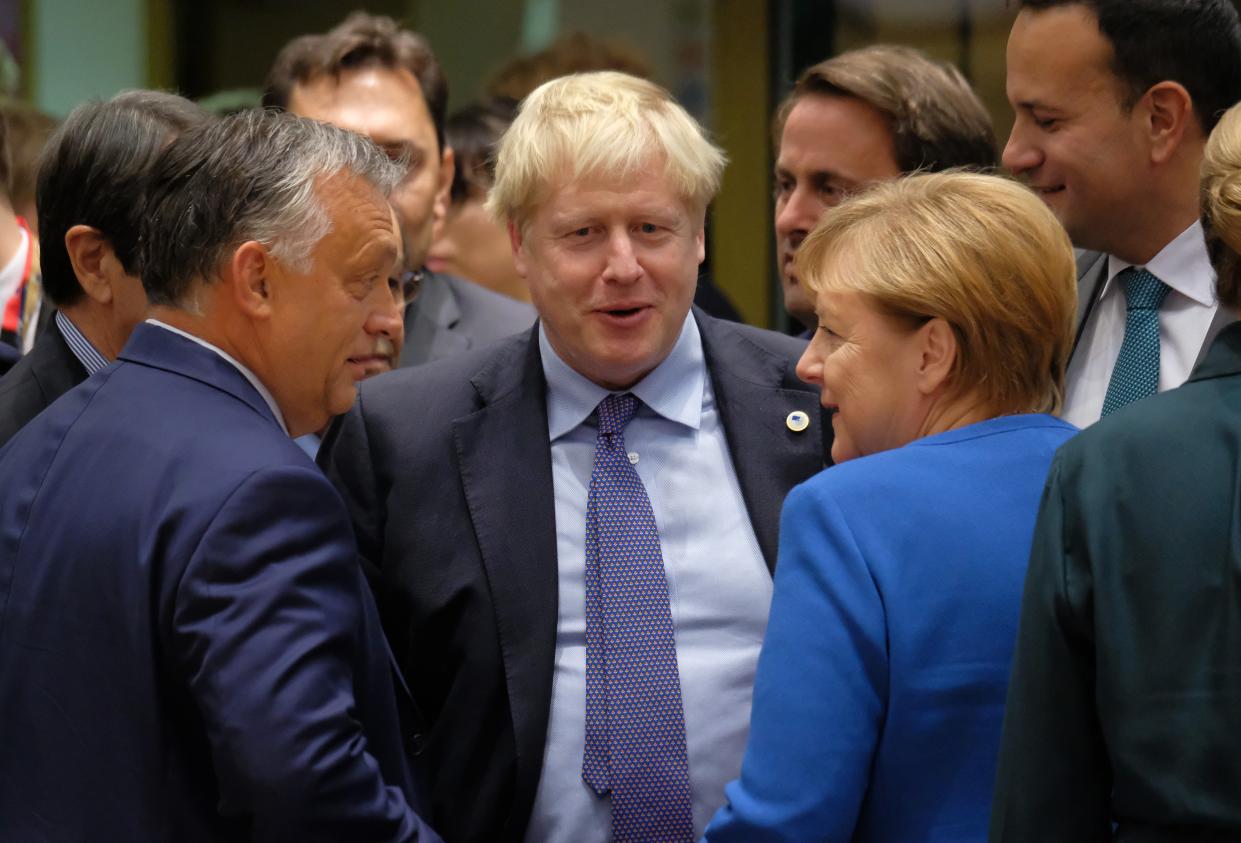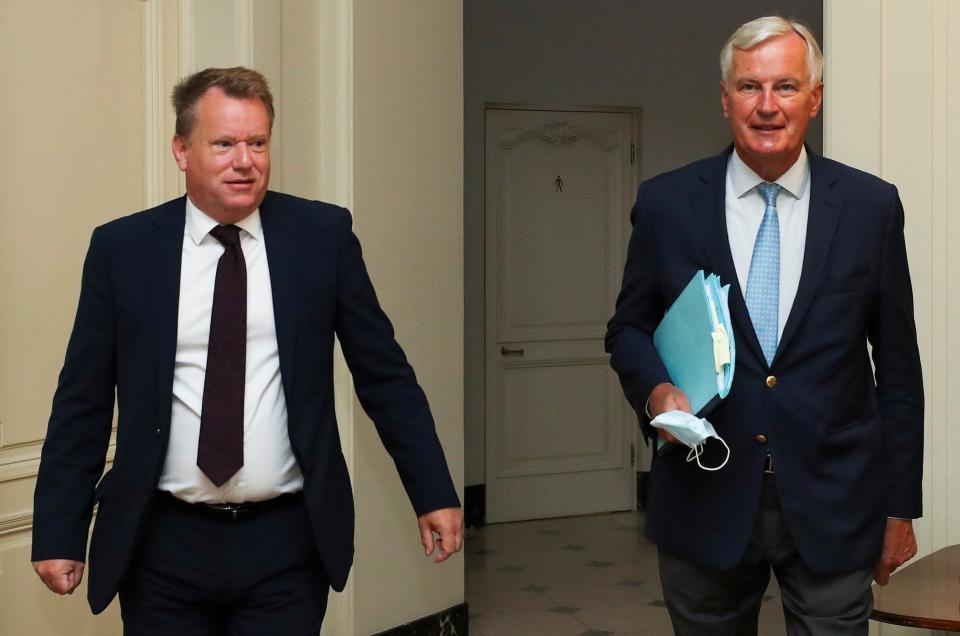How likely is a Brexit deal? Top experts calculate probability of trade agreement

Brexit negotiations continue to fascinate, infuriate and exhaust millions of us desperate to know what the outcome will be in the weeks ahead. When there is such intense uncertainty about something so hugely important, it can be oddly comforting to reach for the precision of numbers.
Cabinet Office minister Michael Gove recently told MPs there was a “66 per cent” chance of a trade deal with the EU before the end of the transition period. Some pundits are even more confident than Gove, given the strong incentives for an agreement on both sides.
But not quite as confident as ITV host Robert Peston, who said earlier this week he believes the likelihood of a deal is “quite close to 100 per cent”, before adding: “It would be quite an achievement to muck it up. That said, we live in an age of incompetence, so I guess anything is possible.”
So what is the most likely outcome after Boris Johnson’s big threat to walk away? The Independent asked some of the world’s leading Brexit analysts to explain the remaining barriers to a deal – and what sort of chances they give Europe’s leaders of breaking through and forging an agreement.
Mujtaba Rahman, managing director of Europe at the Eurasia Group:
“Fishing rights is going to be one of the most difficult areas to strike an agreement on. It’s something of a zero-sum game – what one side wins, the other side will lose. There are a large number of EU countries, not just France, that are dug in on retaining large quotas in British waters.
The level-playing field issues on state aid are now slightly less complicated. David Frost and Michael Gove have indicated they can accept a set of principles. Ultimately the compromise is unlikely to meaningfully constrain what the UK government can do on subsiding British companies, not least because historically the government has used state aid much less than its continental European peers.
The government is also opposing binding and enforceable commitments in the areas of labour, environmental and fiscal policy. But the UK won’t move on these level-playing field issues until they get some sign of compromise on fisheries. Indeed, there are now signs the French may be willing to do so. It’s possible the landing zone for a deal is around mid-November, but that could slip further into late November, even December – I’ve heard multiple EU sources suggest this.
I still think a deal is probable, mainly because of difficult domestic politics that will propel Boris Johnson towards a deal – the pandemic, the questions of competence that have been levelled by the Labour opposition and the momentum behind Scottish independence. At Downing Street, there’s no strong, intrinsic belief in the positive value of a trade deal. But political problems mean they have a strong incentive to get one.” Chances of deal: 6/10

Naomi Smith, chief executive of Best for Britain:
“The killer question is what sort of deal we have time to agree upon. Best for Britain’s recent poll of 8,000 voters showed around two-thirds of those with an opinion believe a no-deal Brexit is a bad idea. So from both a practical and political perspective, the government needs to agree a deal of some sort to keep the country on-side.
Unfortunately, the time to agree a wide-ranging set of arrangements – the sort of deal that Boris Johnson promised – has slipped away and there is now precious little time in which to negotiate. A lightweight deal is still possible, right until the 11th hour. And, while that will still result in additional costs and barriers to UK-EU trade, it will be far less damaging than the head-in-the-sand madness of a no-deal result.
A botched exit from Europe will pile costs and misery on top of the costs and misery from the pandemic, and threaten the Union as well. Johnson desperately needs a deal if he is not to be remembered as the prime minister who broke the UK, and then broke up the UK.” Chances of a deal: 5/10

Georgina Wright, senior Brexit researcher at the Institute for Government:
“On level-playing field issues, Michael Gove and David Frost indicated that a solution to the dispute over state aid lies in an institutional structure to manage any divergence in standards and rules. The UK and EU must now figure out the detail of what that looks like.
On fishing rights, the EU has upheld a maximalist position over access to British waters, which I think will be climbed down from – so there is a landing zone for an agreement there too. But before then, there will be a lot of noise: EU leaders and MEPs from coastal states will need to be seen to stand up for their constituents, but when push comes to shove, will the European parliament vote down a deal over fisheries if member states have agreed to it? I highly doubt it.
The problem is that 31 December is soon, but not quite soon enough. Both sides are still looking at each other, sizing each other up and unwilling to move first. But it looks like talks will continue, though I suspect there won’t be any real movement until November. But even if there is a trade deal, that won’t be the end of UK-EU talks: Brexit is the gift that keeps on giving.” Chances of a deal: 7/10
Steve Peers, professor of EU law and world trade law at University of Essex:
“If the UK government decides to continue with the negotiations, it looks as though the two sides are moving slightly closer together on state aid subsidies and police and justice cooperation issues – but are still some ways apart on fisheries and a dispute settlement system.
It is hard to resolve the fisheries issues without either reducing the catches of some on the EU side, or disappointing those on the UK side expecting to catch more fish. It looks like they may also have unresolved differences on other “level playing field” issues – labour and environmental law, for instance.
The EU wants the UK at least to commit to uphold current EU standards on those areas, but the UK prefers the weaker version of a level playing field which the EU agreed with Canada and Japan. The EU side will also still expect the UK to remove the controversial parts of the internal market bill. So a final deal would need movement from one or both sides on fisheries, dispute settlement and a level playing field – which does not look imminent right now.” Chances of a deal: 4/10
Professor Anand Menon, director of UK in a Changing Europe:
“I don’t think anyone ever thought there would be a deal until heads of state were properly engaged in this process – Michel Barnier and David Frost can’t make the sort of concessions needed to get a deal.
While it might be easier in the short term, politically, for France to show French fishermen they are standing up for their interests, the economic problems of a no-deal outcome would far outweigh any political gain. I think there’s a lot of brinkmanship going on, but both sides have a strong preference for getting a deal over not getting a deal. My hunch is that when push comes to shove both sides will be willing to make the concessions needed to get it over the line.
If there isn’t a deal this year, the UK has to go back to the negotiating table for a free trade agreement at some point. How and when that happens would depend on the level of pain a no-deal outcome could inflict next year.” Chances of a deal: “More likely than not.”
Read more
What Brussels insiders really think about crunch Brexit talks

 Yahoo News
Yahoo News 
